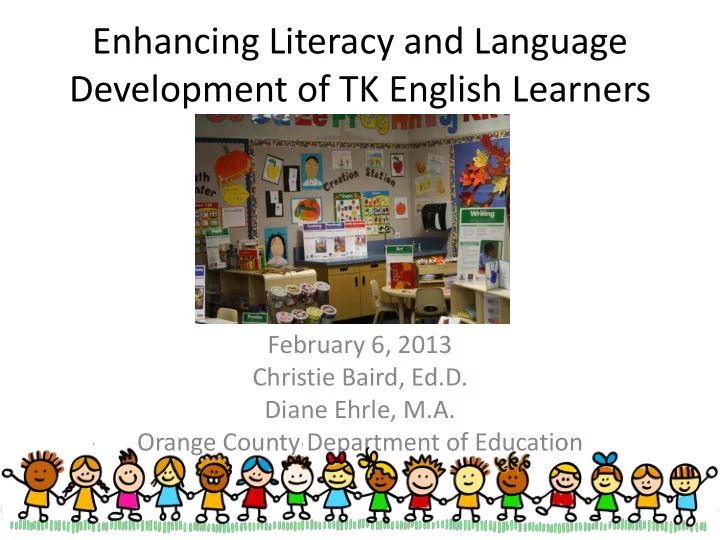

Enhancing Literacy and Language Development of TK English Learners February 6, 2013 Christie Baird, Ed.D. Diane Ehrle, M.A. Orange County Department of Education
Outcome for Session • Review how children learn language • Learn successful research-based strategies for language development • Discuss how to integrate strategies into own program • Build collaboration
Relevant Research • Language is developed in stages (Tabors and Snow, 1994).
Stages of Language Acquisition Observational and Listening Stage Home Language Stage Telegraphic and Formulaic Stage Fluid Language Use Stage Tabors, 2008
Relevant Research, continued • Teachers can create a supportive classroom environment for second language learners while acknowledging the importance of children’s home language and cultures (Tabors, 1997). • The brain is wired by experience (Healy, 1999; Wolfe, 2003).
Child Development • All domains of a child’s development are closely related. • Children are active learners. • Development advances when children have the opportunity to practice newly acquired skills. • Children develop and learn best when they are in a community where they are safe and valued. National Association for the Education Young Children Developmental Principles, 2008
How is Language Learned? • Play • Engaging in stimulating talk • Hearing books read aloud • Repetition and imitation • Explicit teaching Echevarr ì a, Short, & Peterson, 2012
Second Language Development Acquisition of Language Acquisition of Word Meaning • Input + Intake + Production Model • Naturalistic and Informal Encounters • Naturalistic Settings • Instruction • Preschool Settings • Silent or Receptive Stage • Caretaker Speech • Teacher Oral Language Types of Language • Basic Communication • Academic/Decontextualized Language and Literacy Relationships Classroom Opportunities for Second Language Development Conversations Centers Transitions Socio- Mealtimes and dramatic Storybook Routines Play Reading Roberts, T. 2009
Student Achievement and Motivation “An enriched classroom environment is necessary for stimulating, challenging, and actively involving children in their thinking.” Pat Wolfe, 2003
Components of an Enriched Classroom for English Learners • Teacher Preparation • Building Background • Comprehensible Input • Strategies • Interaction • Practice and Application
Our Challenge Teachers must balance comprehensible input with rich challenging vocabulary – academic language
Strategies for Teachers • Start with what the child knows • Scaffold communication • Expand and extend • Raise expectations • Use repetition • Offer consistent routines
Language Acquisition “When you hear the motor running, you know the brain is engaged.” Jim Cummins
Language Rich Classroom • Daily teacher read alouds • Intentional conversations • Open-ended questions • Cognitively challenging discussions • Planned experiences • Retelling stories • Engaging center materials
Vocabulary Tiers for English Learners • Tier One - basic words that students know in primary language and in second language, or just need the English label for it. • Tier Two - high frequency words in story books, rhymes, center activities and everyday instruction. • Tier Three - low frequency words, are those words that are limited to specific domains such as, social studies, math or science words. (Expository jargon) Beck, McKeown, and Kucan, 2002
Identifying Tier Two Words • Importance and utility – words that will appear across a variety of domains • Instructional potential – words that can be worked with in a variety of ways • Conceptual Understanding – words for which students understand the general concept but provide precision and specificity in describing the concept
Essentials of Academic Language Development • Prepare for vocabulary instruction • Teach vocabulary that really matters • Engage students in correctly applying new vocabulary through intentional experiences • Assess students routinely on vocabulary
Focus These strategies focus student attention on the unit or theme and activate and build background knowledge • Picture Talk • Roll and Tell • Picture Dictionary
Input Input strategies allow for intentional teaching of vocabulary and concepts • Read Aloud • Dialogic Reading • Morning Message • Pictorials
Guided Practice Guided Practice provides time to intentionally practice new vocabulary words and concepts • Centers • Songs and chants • Story retells • Strategic Interaction Strategies
Emergent Reading and Writing Children have opportunity to use new vocabulary through print activities • Journals • Writing Center • Experience Charts • Response to Literature • Take home activities
Contacts Christie Baird Diane Ehrle cbaird@ocde.us dehrle@ocde.us 714-327-8181 714-966-4173 Orange County Department of Education 200 Kalmus Drive Costa Mesa, CA 92628
Recommend
More recommend